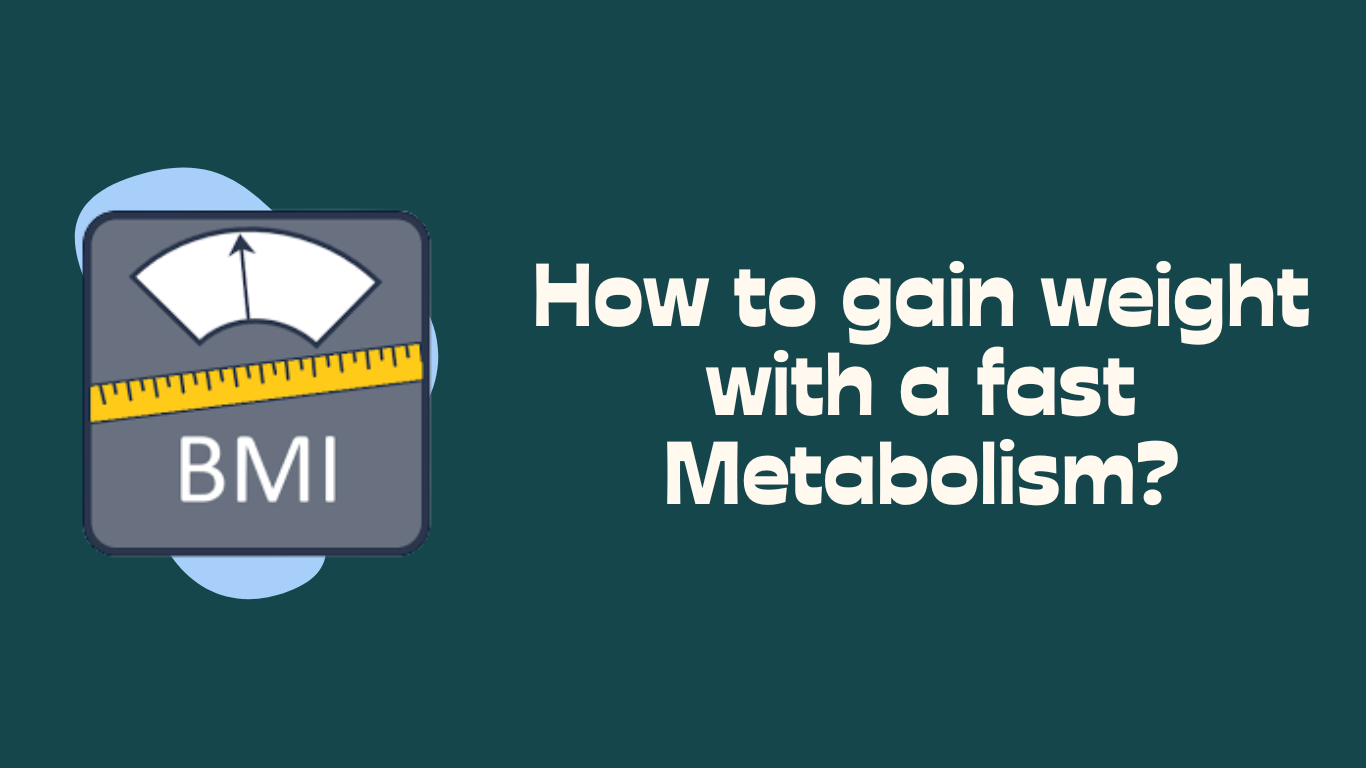Having a fast metabolism can be a double-edged sword. While it allows you to burn calories quickly, it can make gaining weight a real challenge. For individuals with a fast metabolism looking to increase their weight, it’s essential to adopt a strategic approach. This article aims to provide a comprehensive guide on how to gain weight effectively, even with a fast metabolism. With the right mindset, nutrition, exercise, and lifestyle adjustments, achieving your weight gain goals is within reach.
Understanding Your Metabolism:
Before diving into the strategies, it’s crucial to understand the concept of metabolism. Metabolism refers to the process by which your body converts food into energy. A fast metabolism means your body burns calories at a rapid rate, making it difficult to gain weight. Accepting this reality will help you stay motivated and patient throughout your weight gain journey.
Set Realistic Goals:
Establishing realistic weight gain goals is vital for success. Aim for a gradual and healthy weight gain of around 0.5 to 1 pound per week. Rapid weight gain may result in an unhealthy increase in body fat rather than lean muscle mass.
Focus on Nutrition:
Proper nutrition is the cornerstone of weight gain. Here are some key guidelines to follow:
a. Caloric Surplus: To gain weight, you must consume more calories than your body burns. Calculate your daily caloric needs using online calculators and aim to consume 300-500 calories above that number.
b. Macronutrient Balance: Include a good balance of carbohydrates, proteins, and healthy fats in your diet. Carbohydrates provide energy, proteins support muscle growth, and healthy fats aid in nutrient absorption. Opt for whole grains, lean meats, poultry, fish, legumes, nuts, seeds, and healthy oils.
c. Frequent Meals: Instead of three large meals, opt for smaller, more frequent meals throughout the day. This approach ensures a constant supply of nutrients for your body to build muscle and gain weight.
d. Calorie-Dense Foods: Incorporate calorie-dense foods into your diet, such as avocados, nuts, nut butter, whole milk, cheese, dried fruits, and granola. These foods pack more calories in smaller portions, making it easier to meet your daily caloric goals.
e. Protein Intake: Increase your protein intake to support muscle growth. Aim for 1.2-1.5 grams of protein per kilogram of body weight. Include protein-rich foods like eggs, chicken, turkey, lean beef, fish, tofu, and legumes.
Strength Training:
To gain weight with a fast metabolism, regular strength training is essential. Focus on compound exercises that target multiple muscle groups simultaneously. Some effective exercises include squats, deadlifts, bench presses, shoulder presses, and rows. Aim for 3-4 strength training sessions per week, allowing at least 48 hours of rest between sessions. Gradually increase the weights you lift to challenge your muscles and promote growth.
Progressive Overload:
Progressive overload is the principle of gradually increasing the stress placed on your muscles during training. This progression encourages muscle growth. Keep track of your lifts, weights, and repetitions, and aim to gradually increase them over time. This could involve adding more weight, performing more repetitions, or decreasing rest periods between sets.
Incorporate Cardiovascular Exercise:
While cardio exercise burns calories, it’s still important for overall fitness and cardiovascular health. However, limit excessive cardio sessions as they may impede weight gain efforts. Instead, opt for moderate-intensity cardio exercises such as brisk walking, swimming, or cycling for 2-3 sessions per week, each lasting around 30 minutes. This helps maintain cardiovascular health without excessively taxing your calorie expenditure.
Rest and Recovery:
Adequate rest and recovery are crucial for muscle growth. When you engage in intense workouts, your muscles undergo microscopic damage. Allow your body time to repair and rebuild by getting 7-8 hours of quality sleep each night. Additionally, incorporate rest days into your training routine to prevent overtraining and promote optimal muscle growth.
Stay Hydrated:
Proper hydration is often overlooked but is essential for overall health and weight gain. Aim to drink at least 8-10 glasses of water per day. Hydration supports nutrient absorption, muscle function, and overall bodily processes.
Minimize Stress:
Chronic stress can interfere with weight gain efforts. High-stress levels elevate cortisol, a hormone that can promote muscle breakdown and hinder weight gain. Practice stress management techniques such as meditation, deep breathing exercises, yoga, or engaging in hobbies that bring you joy. Prioritize self-care and take time to relax and unwind.
Check your BMI at NHS BMI Calculator
Seek Professional Guidance:
If you’re struggling to gain weight despite your efforts, consider consulting a registered dietitian or a nutritionist. They can provide personalized guidance and help create a tailored meal plan to suit your specific needs and goals.
Conclusion:
Gaining weight with fast metabolism may require additional effort and patience, but it is entirely possible with the right approach. Focus on creating a caloric surplus, incorporating strength training, maintaining a balanced diet, and prioritizing rest and recovery. Remember to set realistic goals, celebrate small victories along the way, and stay committed to your weight gain journey. With perseverance and consistency, you can achieve your desired weight and build a stronger, healthier body.
